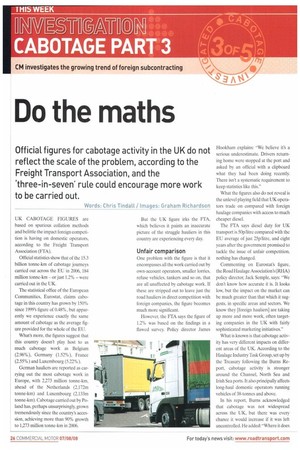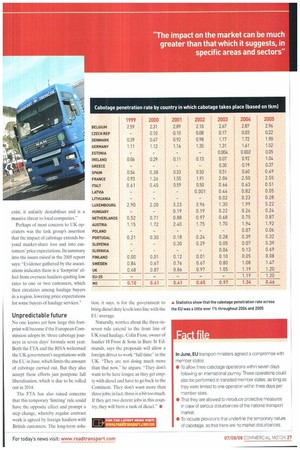Do the maths
Page 26

Page 27

If you've noticed an error in this article please click here to report it so we can fix it.
Official. figures for cabotage activity in the UK do not reflect the scale of the problem, according to the Freight Transport Association, and the 'three-in-seven' rule could encourage more work to be carried out.
Words: Chris Tindall / Images: Graham Richardson
UK CABOTAGE FIGURES are based on spurious collation methods and belittle the impact foreign competition is having on domestic operators, according to the Freight Transport Association (ETA).
Official statistics show that of the 15.3 billion tonne-km of cabotage journeys carried out across the EU in 2006, 184 million tonne-km — or just 1.2% — were carried out in the UK.
The statistical office of the European Communities, Eurostat, claims cabotage in this country has grown by 150% since 1999's figure of 0.48%, but apparently we experience exactly the same amount of cabotage as the average figure provided for the whole of the EU.
What's more, the figures suggest that this country doesn't play host to as much cabotage work as Belgium (2.96%), Germany (1.52%), France (2.55%) and Luxembourg (5.22%).
German hauliers are reported as carrying out the most cabotage work in Europe, with 2,273 million tonne-km, ahead of the Netherlands (2,172m tonne-km) and Luxembourg (2,133m tonne-km). Cabotage carried out by Poland has, perhaps unsurprisingly, grown tremendously since the country's accession, achieving more than 90% growth to 1,273 million tonne-km in 2006. But the UK figure irks the FTA, which believes it paints an inaccurate picture of the struggle hauliers in this country are experiencing every day.
Unfair comparison
One problem with the figure is that it encompasses all the work carried out by own-account operators, smaller lorries, refuse vehicles, tankers and so on, that are all unaffected by cabotage work. If these are stripped out to leave just the road hauliers in direct competition with foreign companies, the figure becomes much more significant.
However, the PTA says the figure of 1.2% was based on the findings in a flawed survey. Policy director James Hoolcham explains: "We believe it's a serious underestimate. Drivers returning home were stopped at the port and asked by an official with a clipboard what they had been doing recently. There isn't a systematic requirement to keep statistics like this."
What the figures also do not reveal is the unlevel playing field that UK operators trade on compared with foreign haulage companies with access to much cheaper diesel.
The FTA says diesel duty for UK transport is 50p/litre compared with the EU average of just 25p/litre, and eight years after the government promised to tackle the issue of unfair competition, nothing has changed.
Commenting on Eurostat's figure, the Road Haulage Association's (RHA) policy director, Jack Semple, says: "We don't know how accurate it is. It looks low, but the impact on the market can be much greater than that which it suggests, in specific areas and sectors. We know they Foreign hauliers] are taking up more and more work, often targeting companies in the UK with fairly sophisticated marketing initiatives."
What is known is that cabotage activity has very different impacts on different areas of the UK. According to the Haulage Industry Task Group, set up by the Treasury following the Burns Report, cabotage activity is stronger around the Channel, North Sea and Irish Sea ports. It also principally affects long-haul domestic operators running vehicles of 38-tonnes and above.
In his report, Bums acknowledged that cabotage was not widespread across the UK, but there was every chance it would increase if it was left uncontrolled. He added: "Where it does exist, it unfairly destabilises and is a massive threat to local companies."
Perhaps of most concern to UK operators was the task group's assertion that the impact of cabotage extends beyond market-share loss and into customers' price expectations. Its summary into the issues raised in the 2005 report says: "Evidence gathered by the associations indicates there is a 'footprint' effect from overseas hauliers quoting low rates to one or two customers, which then circulates among haulage buyers in a region, lowering price expectations for some buyers of haulage services."
Unpredictable future No one knows yet how large this footprint will become if the European Commission adopts its 'three cabotage journeys in seven days' formula next year. Both the FTA and the RI-IA welcomed the UK government's negotiations with the EU in June, which limits the amount of cabotage carried out. But they also accept these efforts just postpone full liberalisation, which is due to be rolled out in 2014.
The FTA has also raised concerns that this temporary 'limiting' rule could have the opposite effect and prompt a step change, whereby regular contract work is agreed by foreign hauliers with British customers. The long-term solu tion, it says, is for the government to A Statistics show that the cabotage penetration rate across bring diesel duty levels into line with the the EU was a little over 1% throughout 2004 and 2005 EU average.
Naturally, worries about the three-inseven rule extend to the front line of UK road haulage. Cohn Frost, owner of haulier H Frost & Sons in Bury St Edmunds, says the proposals will allow a foreign driver to work "full-time" in the In June, EU transport ministers agreed a compromise with UK. "They are not doing much more member states: than that now." he argues. "They don't • To allow three cabotage operations within seven days want to be here longer, as they get empfollowing an international journey. These operations could ty with diesel and have to go back to the also be performed in transited member states. as long as Continent. They don't want more than they were limited to one operation within three days per three jobs; in fact, three is a bit too much. member state.
If they get two decent jobs in this coun• That they are allowed to introduce protective measures try, they will burn a tank of diesel." in case of serious disturbances of the national transport


























































































































































